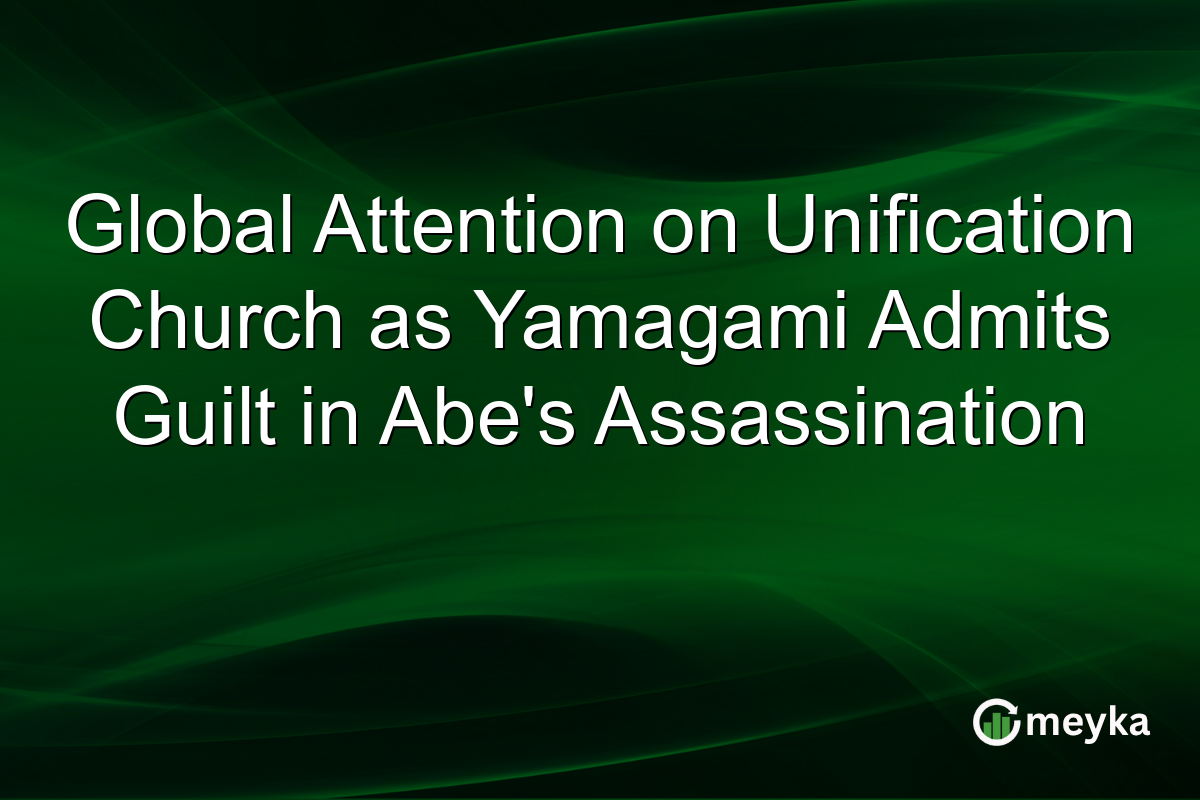Global Attention on Unification Church as Yamagami Admits Guilt in Abe’s Assassination
The trial of Tetsuya Yamagami has taken a dramatic turn with his admission of guilt in the assassination of former Japanese Prime Minister Shinzo Abe. This case not only captures global attention but also places the controversial Unification Church under the microscope due to suspected ties with Japanese politicians. As the world watches, the potential impact on political dynamics in Japan is immense. This development could reshape political alliances and influence upcoming electoral strategies across the nation.
The Dynamics of the Shinzo Abe Assassination Trial
The Shinzo Abe assassination trial has been a significant focal point in both Japanese and international media. Tetsuya Yamagami recently confessed to the crime, causing ripples throughout Japan’s political landscape. The trial has brought forward key details connecting the Unification Church to Japanese political figures, highlighting concerns over the organization’s influence.
As Yamagami admits guilt, questions intensify around how much political leaders can be held accountable for associations with controversial religious groups. This shows the complexity of political-religious relationships in Japan, potentially leading to new legislation regulating such ties.
The Unification Church Impact
The Unification Church, often seen amid controversies, is again at the center of a turbulent narrative. Its connections to Japan’s political elite have sparked debates over ethical governance and transparency. Concerns are rising that the Church exerts undue influence, affecting policy decisions.
Politicians who have benefited from the Church’s support now face increased scrutiny. This could lead to a significant political shake-up, affecting both public trust and future electoral outcomes. The revelations have reinvigorated calls for clearer boundaries between religion and state.
Japan’s Political Ties Under Scrutiny
Tetsuya Yamagami’s verdict has prompted intense introspection within Japan’s ruling factions. Political figures linked to the Unification Church are under public pressure to disclose the nature and extent of these relationships. This backdrop of scandal favors opposition parties aiming to capitalize on ruling party vulnerabilities.
As a result, political realignment seems likely, with lawmakers seeking to distance themselves from controversial entities. This shift could influence Japan’s policy direction, international relationships, and internal governance strategies. Transparency is becoming an urgent requirement for political survival.
https://news.sky.com/story/man-admits-murdering-japans-former-prime-minister-shinzo-abe-13459224
Potential Political Upheaval and Reforms
The broad implications of Abe’s assassination trial stretch beyond courtroom details. Calls for reforms are rising, aiming to curb the influence of religious organizations in politics. Yamagami’s actions could spur legislative changes, making political donations and affiliations more transparent.
Such reforms may also bring about fresh debates on constitutional changes and bolster public demands for better ethical standards. This could transform Japan’s political landscape, encouraging a more open democratic process, crucial for gaining international trust.
This situation is a reminder of the delicate balance between belief, influence, and power.
Final Thoughts
The trial of Tetsuya Yamagami, centered on the assassination of Shinzo Abe, underscores the intricate and often controversial ties between political spheres and religious organizations like the Unification Church. With Yamagami’s guilty plea, scrutiny intensifies, not just on individual culpability, but on systemic relationships that may undermine public trust.
As reforms are anticipated, Japan faces a pivotal moment to redefine its political integrity and governance structure. These developments highlight the importance of transparency and accountability, crucial for ensuring democratic resilience. As shifts in political ties occur, stakeholders remain watchful, anticipating Japan’s journey toward reformation and restoration of public confidence.
FAQs
The Unification Church is implicated due to alleged connections with Japanese political figures. These ties have been examined due to their potential influence on political decisions, motivating scrutiny during Yamagami’s trial.
Yamagami’s plea clarifies the case but also emphasizes deeper issues about political associations with controversial groups like the Unification Church. This could lead to legislative changes in Japan.
It could lead to major shifts, as political figures reassess their relationships with religious organizations. This may trigger reformative policies and affect voter trust and electoral strategies.
Reforms could include stricter regulations on political donations and clearer boundaries between political and religious affiliations to improve transparency and ethical governance.
The international community is closely monitoring the implications, as they affect Japan’s political stability and transparency, crucial for maintaining global trust and cooperation.
Disclaimer:
This is for information only, not financial advice. Always do your research.






